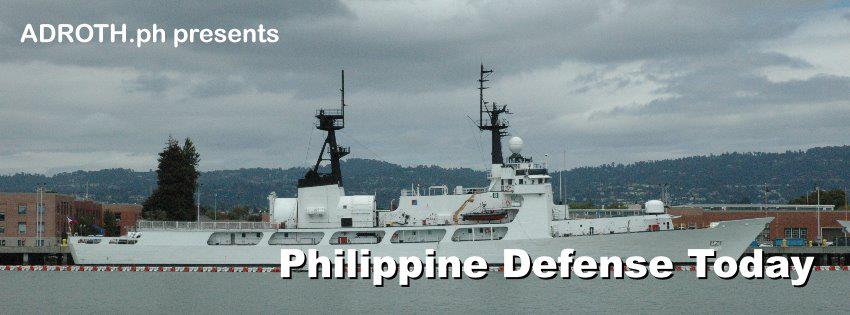
Philippine Defense Today (Adroth.ph)
In Defense of the Republic of the PhilippinesResponding to continued Chinese refusal to end their occupation of Bajo de Masinloc / Panatag Shoal, the Philippine Department of Foreign Affairs has announced that it would bring China before an Arbitration Tribunal in accordance with the United Nations Convention on the Law of the Sea. The following is an excerpt of the DFA press release:
The Philippines has exhausted almost all political and diplomatic avenues for a peaceful negotiated settlement of its maritime dispute with China. On numerous occasions, dating back to 1995, the Philippines has been exchanging views with China to peacefully settle these disputes. To this day, a solution is still elusive. We hope that the Arbitral Proceedings shall bring this dispute to a durable solution.
< Edited >
Allow me, however, to highlight some salient points in the Notification and Statement of Claim:
The Philippines asserts that China’s so-called nine-dash line claim that encompasses virtually the entire South China Sea/West Philippine Sea is contrary to UNCLOS and thus unlawful.
Within the maritime area encompassed by the 9-dash line, China has also laid claim to, occupied and built structures on certain submerged banks, reefs and low tide elevations that do not qualify as islands under UNCLOS, but are parts of the Philippine continental shelf, or the international seabed. In addition, China has occupied certain small, uninhabitable coral projections that are barely above water at high tide, and which are “rocks” under Article 121 (3) of UNCLOS.
China has interfered with the lawful exercise by the Philippines of its rights within its legitimate maritime zones, as well as to the aforementioned features and their surrounding waters.
The Philippines is conscious of China’s Declaration of August 25, 2006 under Article 298 of UNCLOS (regarding optional exceptions to the compulsory proceedings), and has avoided raising subjects or making claims that China has, by virtue of that Declaration, excluded from arbitral jurisdiction.
In this context, the Philippines is requesting the Arbitral Tribunal to issue an Award that, among others:
– Declares that China’s rights in regard to maritime areas in the South China Sea, like the rights of the Philippines, are those that are established by UNCLOS, and consist of its rights to a Territorial Sea and Contiguous Zone under Part II of UNCLOS, to an EEZ under Part V, and to a Continental Shelf under Part VI;
– Declares that China’s maritime claims in the SCS based on its so-called nine-dash line are contrary to UNCLOS and invalid;
– Requires China to bring its domestic legislation into conformity with its obligations under UNCLOS; and
– Requires that China desist from activities that violate the rights of the Philippines in its maritime domain in the West Philippine Sea.
The Philippines asserts that the Arbitral Tribunal has jurisdiction to hear and make an award based on its Notification and Statement of Claim because the dispute is about the interpretation and application by States Parties of their obligations under the UNCLOS. Article 287 (1) of UNCLOS provides that “settlement of disputes concerning the interpretation and application of this Convention” may be referred by the Parties for resolution under Part XV of UNCLOS.
Article 287 of UNCLOS: Choice of procedure appears below.
1. When signing, ratifying or acceding to this Convention or at any time thereafter, a State shall be free to choose, by means of a written declaration, one or more of the following means for the settlement of disputes concerning the interpretation or application of this Convention:
(a) the International Tribunal for the Law of the Sea established in accordance with Annex VI;
(b) the International Court of Justice;
(c) an arbitral tribunal constituted in accordance with Annex VII;
(d) a special arbitral tribunal constituted in accordance with Annex VIII for one or more of the categories of disputes specified therein.
2. A declaration made under paragraph 1 shall not affect or be affected by the obligation of a State Party to accept the jurisdiction of the Seabed Disputes Chamber of the International Tribunal for the Law of the Sea to the extent and in the manner provided for in Part XI, section 5.
3. A State Party, which is a party to a dispute not covered by a declaration in force, shall be deemed to have accepted arbitration in accordance with Annex VII.
4. If the parties to a dispute have accepted the same procedure for the settlement of the dispute, it may be submitted only to that procedure, unless the parties otherwise agree.
5. If the parties to a dispute have not accepted the same procedure for the settlement of the dispute, it may be submitted only to arbitration in accordance with Annex VII, unless the parties otherwise agree.
6. A declaration made under paragraph 1 shall remain in force until three months after notice of revocation has been deposited with the Secretary-General of the United Nations.
7. A new declaration, a notice of revocation or the expiry of a declaration does not in any way affect proceedings pending before a court or tribunal having jurisdiction under this article, unless the parties otherwise agree.
8. Declarations and notices referred to in this article shall be deposited with the Secretary-General of the United Nations, who shall transmit copies thereof to the States Parties.